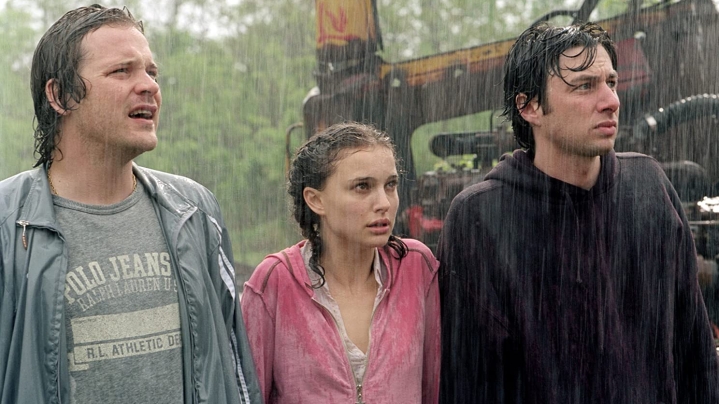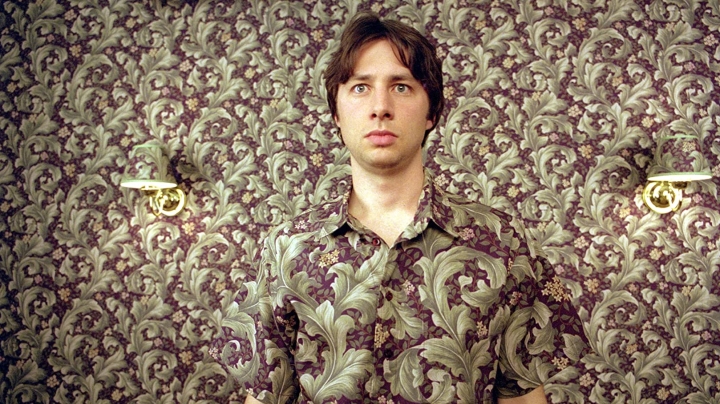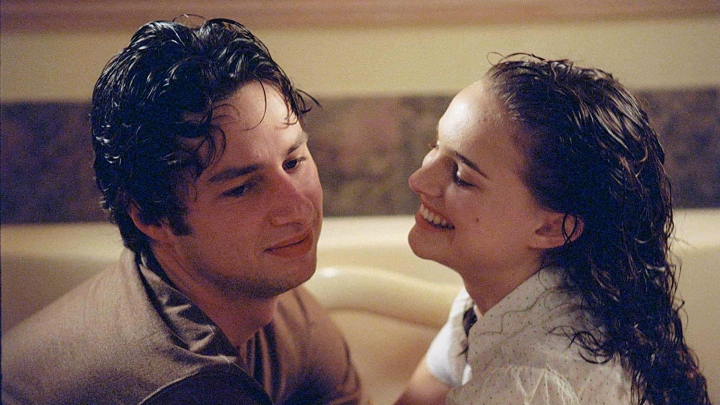Year: 2004
Runtime: 104 minutes
Director: Zach Braff
Writer: Zach Braff
Starring: Zach Braff, Peter Sarsgaard, Natalie Portman
By Caz Armstrong
“Garden State” (2004) is a mixed bag for a number of reasons. But some aspects of its depiction of mental health are very well portrayed, especially for its time.
Andrew (Zach Braff) returns to his home town to attend his mother’s funeral. He’s depressed with a lot of baggage, and is now dealing with grief as best he can in his highly medicated state. While there he meets Sam (Natalie Portman) who encourages him to see life differently. Over the course of a few days, Andrew works on closing a painful chapter in his life and reopening a new and more hopeful one.

The zany humour of this film can be off-putting. There’s not enough of it to be a full comedy and it doesn’t quite fit with the more somber tone. But the film does show a very specific time in a young adult’s life well. It’s a time of self-reflection and realisation, of self-forgiveness and forgiveness of others.
Zach Braff’s portrayal of the numbness of depression is very well done. He seems largely unaffected by what’s happening around him, withdrawn and interacting at a surface level only for the majority of the film. Yet he still elicits empathy. He is unable to cry, even at his mother’s funeral. He wants to feel real emotions and the medication he has been taking for a long time has left him a shell of a person. Andrew has been over medicated for many years without much care and that’s the reason why it isn’t helpful to him.
Medication can take the sharp edge off a person’s mental state to help them to process what they need to in a healthy way. So hopefully audiences don’t come away with the suggestion that all medication is bad because of Andrew’s experience.

It’s reassuring that the film doesn’t have an epiphany moment that snaps Andrew out of his problems, and his issues and demeanour remain largely the same throughout. You can’t cure an illness by forcing yourself to be happy and you can’t ‘snap out of it’.
“Zach Braff’s portrayal of the numbness of depression is very well done. He seems largely unaffected by what’s happening around him, withdrawn and interacting at a surface level only for the majority of the film.”
Sadly though, he does stop taking his medication cold turkey. This is not a safe or healthy way to come off medication and doing so in real life could have very serious consequences. These consequences are not explored at all.

Sam is the epitome of a manic pixie dream girl. She is inexplicably wacky, acts out in public, even being incapable of sitting normally in a chair because she’s just so damn zany! She has no arc of her own and her purpose is solely to give Andrew a fresh outlook on life and further his emotional journey.
Unfortunately, having a Black adopted brother with a quirky throwaway backstory is used to depict Sam’s family as ‘unusual’. Titembay (Ato Essandoh) is a prop because of his race.
“You can’t cure an illness by forcing yourself to be happy and you can’t ‘snap out of it’…[It] shows the benefit of self-reflection, self-forgiveness, and that changing one’s environment for a few days can help provide perspective.”
The only other woman of note in the film is Andrew’s mother – who has died. Although her influence is felt throughout, it’s only because she has died. Yet another woman’s death used as the impetus for a male protagonist’s actions.

Overall this film is a mixed bag. There are some howlers; the use of the Black brother, the manic pixie dream girl, the sudden cessation of medication, and the potential reading that medication is bad.
But what it does well is show how numbing depression can be, and how it can’t just disappear if you have a happy day or try to snap out of it. It shows the benefit of self-reflection, self-forgiveness, and that changing one’s environment for a few days can help provide perspective.
It’s also positive that despite being the main focus, mental health is not sensationalised or blown out of proportion. It’s not a big dramatic break from reality but it shows the grief and depression that millions feel every day. In that sense it’s more relatable and hopefully some will find it helpful.


